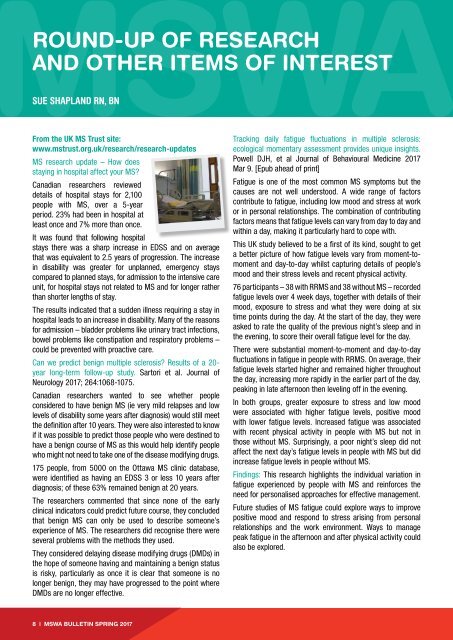MSWA Bulletin Magazine Spring 17_WEB
Create successful ePaper yourself
Turn your PDF publications into a flip-book with our unique Google optimized e-Paper software.
ROUND-UP OF RESEARCH<br />
AND OTHER ITEMS OF INTEREST<br />
SUE SHAPLAND RN, BN<br />
From the UK MS Trust site:<br />
www.mstrust.org.uk/research/research-updates<br />
MS research update – How does<br />
staying in hospital affect your MS?<br />
Canadian researchers reviewed<br />
details of hospital stays for 2,100<br />
people with MS, over a 5-year<br />
period. 23% had been in hospital at<br />
least once and 7% more than once.<br />
It was found that following hospital<br />
stays there was a sharp increase in EDSS and on average<br />
that was equivalent to 2.5 years of progression. The increase<br />
in disability was greater for unplanned, emergency stays<br />
compared to planned stays, for admission to the intensive care<br />
unit, for hospital stays not related to MS and for longer rather<br />
than shorter lengths of stay.<br />
The results indicated that a sudden illness requiring a stay in<br />
hospital leads to an increase in disability. Many of the reasons<br />
for admission – bladder problems like urinary tract infections,<br />
bowel problems like constipation and respiratory problems –<br />
could be prevented with proactive care.<br />
Can we predict benign multiple sclerosis? Results of a 20-<br />
year long-term follow-up study. Sartori et al. Journal of<br />
Neurology 20<strong>17</strong>; 264:1068-1075.<br />
Canadian researchers wanted to see whether people<br />
considered to have benign MS (ie very mild relapses and low<br />
levels of disability some years after diagnosis) would still meet<br />
the definition after 10 years. They were also interested to know<br />
if it was possible to predict those people who were destined to<br />
have a benign course of MS as this would help identify people<br />
who might not need to take one of the disease modifying drugs.<br />
<strong>17</strong>5 people, from 5000 on the Ottawa MS clinic database,<br />
were identified as having an EDSS 3 or less 10 years after<br />
diagnosis; of these 63% remained benign at 20 years.<br />
The researchers commented that since none of the early<br />
clinical indicators could predict future course, they concluded<br />
that benign MS can only be used to describe someone’s<br />
experience of MS. The researchers did recognise there were<br />
several problems with the methods they used.<br />
They considered delaying disease modifying drugs (DMDs) in<br />
the hope of someone having and maintaining a benign status<br />
is risky, particularly as once it is clear that someone is no<br />
longer benign, they may have progressed to the point where<br />
DMDs are no longer effective.<br />
Tracking daily fatigue fluctuations in multiple sclerosis:<br />
ecological momentary assessment provides unique insights.<br />
Powell DJH, et al Journal of Behavioural Medicine 20<strong>17</strong><br />
Mar 9. [Epub ahead of print]<br />
Fatigue is one of the most common MS symptoms but the<br />
causes are not well understood. A wide range of factors<br />
contribute to fatigue, including low mood and stress at work<br />
or in personal relationships. The combination of contributing<br />
factors means that fatigue levels can vary from day to day and<br />
within a day, making it particularly hard to cope with.<br />
This UK study believed to be a first of its kind, sought to get<br />
a better picture of how fatigue levels vary from moment-tomoment<br />
and day-to-day whilst capturing details of people’s<br />
mood and their stress levels and recent physical activity.<br />
76 participants – 38 with RRMS and 38 without MS – recorded<br />
fatigue levels over 4 week days, together with details of their<br />
mood, exposure to stress and what they were doing at six<br />
time points during the day. At the start of the day, they were<br />
asked to rate the quality of the previous night’s sleep and in<br />
the evening, to score their overall fatigue level for the day.<br />
There were substantial moment-to-moment and day-to-day<br />
fluctuations in fatigue in people with RRMS. On average, their<br />
fatigue levels started higher and remained higher throughout<br />
the day, increasing more rapidly in the earlier part of the day,<br />
peaking in late afternoon then leveling off in the evening.<br />
In both groups, greater exposure to stress and low mood<br />
were associated with higher fatigue levels, positive mood<br />
with lower fatigue levels. Increased fatigue was associated<br />
with recent physical activity in people with MS but not in<br />
those without MS. Surprisingly, a poor night’s sleep did not<br />
affect the next day’s fatigue levels in people with MS but did<br />
increase fatigue levels in people without MS.<br />
Findings: This research highlights the individual variation in<br />
fatigue experienced by people with MS and reinforces the<br />
need for personalised approaches for effective management.<br />
Future studies of MS fatigue could explore ways to improve<br />
positive mood and respond to stress arising from personal<br />
relationships and the work environment. Ways to manage<br />
peak fatigue in the afternoon and after physical activity could<br />
also be explored.<br />
8 | <strong>MSWA</strong> BULLETIN SPRING 20<strong>17</strong>


















